United Kingdom in the Eurovision Song Contest
The United Kingdom has participated in the Eurovision Song Contest 62 times. They first participated in the second contest in 1957. The UK has entered every year since 1959, and along with Sweden and the Netherlands, is one of only three countries with Eurovision victories in four different decades. The United Kingdom is one of the "Big 5", along with France, Germany, Italy and Spain who are automatically allowed to participate in the final as they are the five biggest financial contributors to the European Broadcasting Union (EBU). The British public broadcaster, the BBC, broadcasts the event each year and organises the national selection for the entry. The UK has won the contest five times, and has finished second on a record fifteen times.
| United Kingdom | |
|---|---|
 | |
| Member station | BBC |
| National selection events |
Internal selection
|
| Participation summary | |
| Appearances | 62 |
| First appearance | 1957 |
| Best result | 1st: 1967, 1969, 1976, 1981, 1997 |
| Nul points | 2003 |
| External links | |
| BBC page | |
| United Kingdom's page at Eurovision.tv | |
United Kingdom in the Eurovision Song Contest 2020 | |
The United Kingdom's five winners are Sandie Shaw with the song "Puppet on a String" (1967), Lulu with "Boom Bang-a-Bang" (1969 tied), Brotherhood of Man with "Save Your Kisses for Me" (1976), Bucks Fizz with "Making Your Mind Up" (1981) and Katrina and the Waves with "Love, Shine a Light" (1997). The UK has also finished as runner-up on a record 15 occasions; with Pearl Carr & Teddy Johnson (1959), Bryan Johnson (1960), The Allisons (1961), Matt Monro (1964), Kathy Kirby (1965), Cliff Richard (1968), Mary Hopkin (1970), The New Seekers (1972), The Shadows (1975), Lynsey de Paul and Mike Moran (1977), Scott Fitzgerald (1988), Live Report (1989), Michael Ball (1992), Sonia (1993) and Imaani (1998).
The United Kingdom finished outside the top ten on only four occasions at the contest in the 20th century (1978, 1987, 1999) and 2000). In the 21st century, the United Kingdom has a considerably poorer record in the competition, only reaching the top ten twice, with Jessica Garlick third (2002) and Jade Ewen fifth (2009). However, they did finish eleventh with Blue (2011). Since 2003, the UK have finished outside the top 20 on ten occasions, including Jemini's infamous 2003 "nul points" result, which was the first time that the country had come last in the contest. The UK has since finished last in 2008 with Andy Abraham (14 points), in 2010 with Josh Dubovie (10 points), and in 2019 with Michael Rice (11 points).
History
1950s to 1970s
It was alleged that the United Kingdom were expected to take part in the first contest in 1956, and that they missed the submission deadline and therefore could not take part. This was later revealed by the EBU in January 2017 to be a myth created by fans of the contest.[1] The EBU further went on to explain that the Festival of British Popular Song, a contest created by the BBC for the United Kingdom, was the inspiration that brought in format changes to the contest elements from the Eurovision Song Contest 1957 onwards.[1] Patricia Bredin was the first performer to represent the UK at Eurovision, finishing seventh in 1957. The UK was the first choice to stage the third contest in 1958, however following a failure to get an agreement from various artistic unions, the BBC withdrew their bid in the summer of 1957 and the UK did not enter for the second and last time to date.[2]
At their second attempt in the contest in 1959, the UK achieved the first of their record fifteen runner-up positions, when Pearl Carr and Teddy Johnson sang "Sing, Little Birdie". The UK would achieve four more second-place finishes with Bryan Johnson in 1960, The Allisons in 1961, Matt Monro in 1964 and Kathy Kirby in 1965, before eventually winning for the first time in 1967. Sandie Shaw was already a successful performer, having twice topped the UK singles chart and she comfortably won in Vienna with "Puppet on a String", which became her third UK number one and topped the charts all around Europe. In 1968, another successful performer was selected to represent the UK with the song "Congratulations". In London, Cliff Richard gave the UK their sixth second-place finish, losing to Spain's Massiel. "Congratulations" remains one of only two non-winning UK Eurovision songs to top the UK charts. The UK's second victory was provided by the Scottish singer Lulu, who won with the song "Boom Bang-a-Bang" in 1969, in a four-way tie with France, Spain and the Netherlands. Another established performer, she had reached the US #1 spot with "To Sir with Love" in 1967.
Having finished second on three further occasions in the 1970s, with Mary Hopkin in 1970, The New Seekers in 1972 and The Shadows in 1975. The UK achieved their third victory in 1976 with Brotherhood of Man and "Save Your Kisses for Me", who won with 164 points, which would remain the highest points total for ten years. In 1977, the UK finished second for the tenth time represented by singer-songwriters Lynsey de Paul and Mike Moran.
1980s and 1990s
The UK's fourth victory came in 1981, with Bucks Fizz and "Making Your Mind Up". The group was created especially for the UK televised selection contest, "A Song for Europe" (a programme which in later years would be renamed to "Making Your Mind Up"). At Eurovision in Dublin, they defeated Germany's Lena Valaitis by four points. The group went on to continued success, with 13 UK top 40 hits over the next five years. This would be the last UK win for 16 years, although the country continued to be competitive at the contest with four more second-place results during this time. In 1988, Scott Fitzgerald lost to Celine Dion, who was representing Switzerland, by just one point. In 1989, Live Report lost out to Yugoslavia by seven points. Michael Ball in 1992, also finished second, behind Linda Martin of Ireland. The 1993 entry, Sonia, had already had 10 UK top 30 hits, including a 1989 number one with "You'll Never Stop Me Loving You", when she was selected to represent the UK in Millstreet. With one country (Malta) left to vote, Ireland's Niamh Kavanagh led Sonia by 11 points. By the time it got to the announcement of the 12 points, neither the UK or Ireland had been mentioned. If the UK had received the 12, they would have won by one point. In the end Ireland received the top marks and won by 23 points. Despite only finishing eighth in the 1996 contest, Gina G went on to huge success with her entry "Ooh Ah Just a Little Bit", which became only the second non-winning UK entry to top the UK Singles chart. It also reached the US top 20 and received a Grammy nomination. The UK's fifth victory finally came in 1997, when Katrina and the Waves, famous for their 1980s hit "Walking on Sunshine", comfortably won the contest with the song "Love, Shine a Light". They scored 227 points, which would remain the highest points total of the pre semi-final era. At the 1998 contest in Birmingham, Imaani achieved the UK's 15th second-place finish and 20th top two result, with the song "Where Are You?", losing to Israel's Dana International. The UK, as of 2019, has not finished in the top two since.
21st century
The UK has fared less well in the contest in the 21st century. Since girl-group Precious finished 12th in 1999, the UK has failed to reach the top ten in all but two of the last 21 contests (1999–2019) – the exceptions being Jessica Garlick, who finished joint third in 2002 with the song "Come Back" (the UK's only top three result of the century), and Jade Ewen. Ewen in particular, was praised for ending the country's poor run of results for much of the decade, by finishing fifth in 2009 with the song "It's My Time", written by Andrew Lloyd Webber and Diane Warren. In 2003, the UK finished last for the first time with the duo Jemini, who received the infamous "nul points". This remains the only time the UK has failed to score a single point. The country has finished last on three further occasions, with Andy Abraham, who received 14 points in 2008, Josh Dubovie, who received 10 points in 2010, and Michael Rice who received 11 points in 2019.
In 2011, the BBC chose the boy band Blue to represent the UK, they finished 11th with 100 points. In 2012, the UK were facing calls to quit the contest when the UK entry, Engelbert Humperdinck, finished 25th (out of 26) with only 12 points.[3] However, the UK confirmed their participation in the 2013 contest, with the Welsh singer Bonnie Tyler, most famous for her 1983 US and UK number one hit "Total Eclipse of the Heart", who would perform the song "Believe in Me".[4] In Malmö, she finished 19th with 23 points.[5] She went on to win two internationally voted Eurovision Song Contest radio awards for Best Female Singer and Best Song.[6]
In 2014, the BBC internally selected unknown singer Molly Smitten-Downes, through BBC Introducing, which supports new and unsigned acts. She represented the UK in Copenhagen under her artist name Molly. In the final, she performed the song "Children of the Universe", which she co-wrote with Anders Hansson and finished in 17th place with 40 points, having been regarded as one of the favourites to win the contest.[7] In October 2014, Guy Freeman stated that the BBC are still engaging with record companies and the BBC Introducing platform in order to find an entry for the 2015 contest via the internal selection process, but announced that in addition, for the first time since 2008, they are giving the general public the option to submit an entry for consideration.[8][9] Ultimately, the entry for 2015 came through open submission, with the song "Still in Love with You" performed by the duo Electro Velvet.[10] The song finished in 24th place, with only five points, the UK's worst performance in terms of points tally since the infamous nul points of 2003.
On 30 September 2015, the BBC confirmed the national selection show would return in 2016.[11] Six acts competed in the national final on 26 February and the winner was selected entirely through a public vote, consisting of televoting and online voting. "You're Not Alone" performed by Joe and Jake won the national final broadcast live on BBC Four.[12] At the final they came 24th with 62 points in total.[13] Of these only 8 were from the public vote, the second lowest public score, following 0 to the Czech Republic. In spite of the latest disappointing result, the BBC announced that the national final format would be retained for 2017.[14] Six acts again participated in the final, which was held on 27 January 2017. It was broadcast on BBC Two as opposed to BBC Four the previous year, and the winner was determined by a combination of scores from a professional jury and televoting (including votes cast online). Former X Factor contestant Lucie Jones won the show and earned the right to represent the UK at the 2017 contest in Kiev, with the song "Never Give Up on You", becoming the 60th UK Eurovision entry.[15][16] The song was praised for its impressive staging, and finished 15th in the final with a combined score of 111 points, finishing 10th in the jury vote with 99 points and 20th in the televote with 12 points.[17]
After the 2020 contest was cancelled, the BBC announced that BBC Studios would produce Eurovision: Come Together, a replacement show for BBC One featuring classic Eurovision performances, interviews and a look at the entries that would have taken part in 2020. The show is part of the BBC's plan to "entertain the nation in time of need".[18]
United Kingdom and the "Big Four/Five"
In 1999, a rule change allowed the United Kingdom, along with France, Germany and Spain, to automatically qualify for the Eurovision Song Contest final (irrespective of their recent scores and without entering a semi-final), due to being the biggest financial contributors to the EBU.[19] Due to their untouchable status in the contest, these countries became known as the "Big Four" (which became the "Big Five" in 2011 following the return of Italy to the contest).[20]
In 2008, it was rumoured that the "Big Four" would lose their automatic qualification, and would have to compete in the semi-finals for the first time.[21] However, it was announced by the EBU that this would not be the case and the four countries would still automatically qualify for the final of the 2009 contest without having to enter a semi-final,[22] and this has remained as of 2019.
In 2008, the BBC defended using money from TV licence fee payers for the contest when Liberal Democrat MP Richard Younger-Ross had tabled a Commons motion which called on the corporation to withdraw its £173,000 funding for the annual contest. That same year, former Eurovision commentator Sir Terry Wogan claimed that the show is "no longer a music contest" after the result was announced.[23]
Since the introduction of the Big Four/Five, the United Kingdom has finished last in the contest four times, with Germany finishing last three times. The United Kingdom also has the fewest top ten results of the Big Five in the 21st century, but has achieved more top five results than Spain, having reached the top five in 2002 and 2009, while Spain has not reached the top five since the 1995 contest.
National selection ("You Decide")
As well as broadcasting the contest each year, the BBC also organises the selection process for the entry with a televised national final (historically titled A Song For Europe). The process has varied between selecting both performer and song, or just the song, with the artist being selected internally.
For most years the public has been able to vote for the winner, in the past with postcard voting, where the viewers sent postcards with their vote to the BBC, but more recently televoting and online. In 2009 and 2010, the singer was chosen by a public vote and the song internally selected. From 2011 to 2015, there was no televised selection, and both the artist and song were selected internally by the BBC. This resulted in the national selection process being suspended; however, this returned in 2016, re-titled Eurovision: You Decide, with viewers once again choosing which song to enter into the contest. Since 2017, the votes from a professional jury panel have been combined with the public vote to select the winner.
In September 2019, it was announced that the BBC would not hold a public selection for the 2020 contest, and that BBC Studios would partner with record label BMG to produce and release its entry.[24]
Contestants
Below is a list of all songs and their respective performers that have represented the United Kingdom in the contest:[25]
1 |
Winner |
2 |
Second place |
3 |
Third place |
◁ |
Last place |
X |
Contest cancelled |
Congratulations: 50 Years of the Eurovision Song Contest
Although the United Kingdom was entered twice into Congratulations: 50 Years of the Eurovision Song Contest, with Cliff Richard's 1968 runner-up entry "Congratulations" and Brotherhood of Man's 1976 winning song "Save Your Kisses for Me", the BBC decided not to air the event or participate in the voting, but instead aired an hour-long special programme entitled Boom Bang-a-Bang: 50 Years of Eurovision hosted by Terry Wogan.
| Artist | Language | Title | At Congratulations | At Eurovision | |||||
|---|---|---|---|---|---|---|---|---|---|
| Final | Points | Semi | Points | Year | Place | Points | |||
| Cliff Richard | English | "Congratulations" | Failed to qualify | 8 | 105 | 1968 | 2 | 28 | |
| Brotherhood of Man | English | "Save Your Kisses for Me" | 5 ◁ | 230 | 5 | 154 | 1976 | 1 | 164 |
Eurovision: Come Together
Following the cancellation of the 2020 contest due to the COVID-19 pandemic, the BBC decided to host an All Stars contest on the night of what would have been the cancelled 2020 Grand Final. The show broadcast just before the EBU's main replacement show Eurovision Shine A Light. 19 entries were chosen by a panel of experts. Four of them were entries from the United Kingdom.
Hostings
The United Kingdom has hosted the Eurovision Song Contest a record eight times. The United Kingdom stepped in and hosted the contest for the Netherlands in 1960, France in 1963, Monaco in 1972 and Luxembourg in 1974 due to the winning countries' financial and capacity issues. In four occasions (1968, 1977, 1982 and 1998) the UK was given the right to host as a result of a victory. The BBC offered to joint host the 1996 contest in Belfast, Northern Ireland with Irish broadcaster RTÉ if Ireland were to win for a fourth year in a row.
| Year | Location | Venue | Presenters |
|---|---|---|---|
| 1960 | London | Royal Festival Hall | Katie Boyle |
| 1963 | London | BBC Television Centre | Katie Boyle |
| 1968 | London | Royal Albert Hall | Katie Boyle |
| 1972 | Edinburgh | Usher Hall | Moira Shearer |
| 1974 | Brighton | Brighton Dome | Katie Boyle |
| 1977 | London | Wembley Conference Centre | Angela Rippon |
| 1982 | Harrogate | Harrogate International Centre | Jan Leeming |
| 1998 | Birmingham | National Indoor Arena | Terry Wogan and Ulrika Jonsson |
Eurovision Song Contest's Greatest Hits
In 2015, London hosted Eurovision Song Contest's Greatest Hits, an event to commemorate the 60th anniversary, which was recorded for television on 31 March 2015 and was shown in 26 countries, starting with the UK and Ireland on 3 April 2015.[26]
| Year | Location | Venue | Presenters | Image |
|---|---|---|---|---|
| 2015 | London | Eventim Apollo | Graham Norton and Petra Mede | 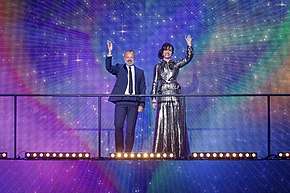 |
Awards
AP Awards
| Year | Category | Song | Performer(s) | Place | Points | Host city |
|---|---|---|---|---|---|---|
| 2004 | Composer Award | "Hold Onto Our Love" | James Fox | 16 | 29 |
Related involvement
Heads of delegation
| Year | Head of delegation | Ref. |
|---|---|---|
| 2012 | Andrew Cartmell | |
| 2014–2017 | Guy Freeman | |
| 2018 | Helen Riddell | |
| 2019 | Andrew Cartmell |
Costume designers
| Year | Costume designers | Ref. |
|---|---|---|
| 1996 | Paco Rabanne | |
| 2009 | Amanda Wakeley |
Commentators and spokespersons
Over the years BBC commentary has been provided by several experienced radio and television presenters, including Tom Fleming, David Vine, David Jacobs, Dave Lee Travis, Pete Murray, John Dunn and Michael Aspel. However, Terry Wogan provided BBC TV commentary every year from 1980 to 2008.[32] It was confirmed on 12 August 2008 that Terry Wogan would no longer present the Eurovision Song Contest for the UK. The BBC Radio 2 DJ, who had fronted the BBC's coverage for 37 years, said it was "time for someone else to take over".[33] He was replaced in 2009 by Graham Norton for the final. Norton has continued in the role ever since.
The final of the contest has been broadcast by BBC One (previously BBC Television Service and BBC TV) since the first contest in 1956, the first live colour transmission of the contest in the United Kingdom was the Eurovision Song Contest 1970, the first high definition broadcast of the contest began in 2007 when the contest was simulcast on BBC HD. The final is also broadcast on radio, initially on BBC Light Programme until the 1967 contest. From 1968 it was broadcast on BBC Radio 1 (simulcast on Radio 2), moving to BBC Radio 2 from the 1971 contest where it has remained ever since (except for 1983–1985). Between 1963 and 1976 and from 1980 until 1985 the contest was also broadcast on BFBS Radio. From 2004 to 2015 both semi-finals were broadcast on BBC Three. Since BBC Three became an online only channel in February 2016, semi-final coverage is now broadcast on BBC Four.[34]
In the 1998 contest, hosted in Birmingham, Terry Wogan acted as both commentator and on-stage presenter (together with Ulrika Jonsson). In the 1980 contest, each song was introduced by a presenter from its country, the United Kingdom entry being introduced by Noel Edmonds.
No British-born broadcaster has either presented or commentated on the live television final for over thirty years, the last being Jan Leeming, host of the 1982 contest.
| Year | Television commentator | Radio commentator | Online/BFBS commentator | Spokesperson | Ref. | |
|---|---|---|---|---|---|---|
| Final | Semi-final | |||||
| 1956 | Wilfrid Thomas | No semi-finals | Unknown | N/A | Did not participate | |
| 1957 | Berkeley Smith | Tom Sloan | David Jacobs | |||
| 1958 | Peter Haigh | Did not participate | ||||
| 1959 | Tom Sloan | Pete Murray | Pete Murray | |||
| 1960 | David Jacobs | Nick Burrell-Davis | ||||
| 1961 | Tom Sloan | Michael Aspel | ||||
| 1962 | David Jacobs | Peter Haigh | Alex Macintosh | |||
| 1963 | Michael Aspel | Pete Murray | ||||
| 1964 | Tom Sloan | Ian Fenner | Kenneth Kendall | |||
| 1965 | David Gell | Alastair Burnet | ||||
| 1966 | John Dunn | Michael Aspel | ||||
| 1967 | Rolf Harris | Richard Baker | Thurston Holland | |||
| 1968 | N/A | Pete Murray | ||||
| 1969 | David Gell, Michael Aspel | John Russell | Colin-Ward Lewis | |||
| 1970 | David Gell | Tony Brandon | ||||
| 1971 | Dave Lee Travis | Terry Wogan | N/A | |||
| 1972 | Tom Fleming | Pete Murray | Terry James | |||
| 1973 | Terry Wogan | Richard Astbury[lower-alpha 6] | ||||
| 1974 | David Vine | Terry Wogan | Colin-Ward Lewis | |||
| 1975 | Pete Murray | Ray Moore | ||||
| 1976 | Michael Aspel | |||||
| 1977 | Pete Murray | N/A | Colin Berry | |||
| 1978 | Terry Wogan | Ray Moore | ||||
| 1979 | John Dunn | |||||
| 1980 | Terry Wogan | Steve Jones | Andrew Pastona | Ray Moore | ||
| 1981 | Ray Moore | N/A | Colin Berry | |||
| 1982 | ||||||
| 1983 | Not broadcast on BBC Radio | Richard Nankivell | ||||
| 1984 | ||||||
| 1985 | ||||||
| 1986 | Ray Moore | N/A | ||||
| 1987 | ||||||
| 1988 | Ken Bruce | |||||
| 1989 | ||||||
| 1990 | ||||||
| 1991 | ||||||
| 1992 | ||||||
| 1993 | ||||||
| 1994 | ||||||
| 1995 | ||||||
| 1996 | ||||||
| 1997 | ||||||
| 1998 | Ken Bruce | |||||
| 1999 | Colin Berry | |||||
| 2000 | ||||||
| 2001 | ||||||
| 2002 | ||||||
| 2003 | Lorraine Kelly | |||||
| 2004 | Paddy O'Connell | |||||
| 2005 | Cheryl Baker | |||||
| 2006 | Fearne Cotton | |||||
| 2007 | Paddy O'Connell, Sarah Cawood | |||||
| 2008 | Paddy O'Connell, Caroline Flack | Carrie Grant | ||||
| 2009 | Graham Norton | Paddy O'Connell, Sarah Cawood | Duncan James | |||
| 2010 | Scott Mills | |||||
| 2011 | Scott Mills, Sara Cox | Alex Jones | ||||
| 2012 | Scott Mills | |||||
| 2013 | Scott Mills, Ana Matronic | |||||
| 2014 | Scott Mills, Laura Whitmore | Ana Matronic | ||||
| 2015 | Scott Mills, Mel Giedroyc | Nigella Lawson | ||||
| 2016 | N/A | Richard Osman | ||||
| 2017 | Katrina Leskanich | |||||
| 2018 | Scott Mills, Rylan Clark-Neal | Mel Giedroyc | ||||
| 2019 | Rylan Clark-Neal | |||||
In recent years, the dual-commentator format during the semi-finals has allowed for the broadcaster to incorporate additional segments, interviews and live viewer interaction during the programme's live airing.[56]
In 2019 the BBC launched Eurovision Calling, a weekly BBC Sounds podcast hosted by Mills and comedian Jayde Adams.[57][58]
Separate entrants
For several years the Scottish National Party (SNP) has campaigned for a place in Eurovision for Scotland but had been rejected numerous times because Scotland is represented as a part of the British entry and is represented by the BBC.[59]
On 11 February 2008 the EBU stated that a Scottish broadcaster could apply for EBU membership, but under the current rules could not enter the Eurovision Song Contest as the BBC currently has exclusive rights to represent the entire United Kingdom.[59] It was announced in late May 2008 that the UK would be participating in the 2009 Contest and, therefore, Scotland was not represented in 2009 as a separate entrant.[60]
Scotland could be represented by STV, ITV Border or BBC Scotland. MEP Alyn Smith has said in the European Parliament: "Other small countries have done it [entered the competition] and I will be happy to help any of the broadcasting companies through the progress."[61][62][63][64]
In 2011 the European Broadcasting Union stated that there was nothing to prevent Scotland from submitting its own entry, although STV stated that there were no current plans for a separate entry.[64]
If Scotland were to participate it is unknown whether or not England, Wales and Northern Ireland would show any interest in entering the Eurovision Song Contest independently as well, although S4C (the Welsh language media channel) has expressed an interest and, in addition, already holds a yearly national song contest called "Cân i Gymru" (Song for Wales).[65] S4C also considered a bid for the Junior Eurovision Song Contest 2008 but decided not to go ahead.[66] In 2009 MEP for Wales Jillian Evans stated her interest in securing Wales a place in the Eurovision Song Contest 2010, Wales could be represented by either BBC Cymru Wales, ITV Wales & West or S4C. There is a small campaign in Northern Ireland for a separate entrant and it could be represented by UTV or BBC Northern Ireland.[67] There are no plans currently for England to enter separately.
However, to date, these proposed changes have not occurred, and the United Kingdom still participates in the Eurovision Song Contest as a single entrant. It was unknown what would happen if Scotland were to become an independent country. However, on 25 November 2013, the Scottish Government released a referendum blueprint which detailed plans for the transfer of BBC Scotland into the Scottish Broadcasting Service (SBS) and joining the EBU, as well as partaking in competitions, including Scottish entries in the Eurovision Song Contest.[68][69] However, the referendum result on 18 September 2014 was to remain part of the United Kingdom, and the aforementioned BBC retains exclusive rights to represent the United Kingdom, including Scotland.[70]
Since 2006, Gibraltarian broadcaster Gibraltar Broadcasting Corporation (GBC) has been attempting to gain EBU membership and thus participate independently in the Eurovision Song Contest. However GBC cannot obtain EBU membership due to the British Overseas Territory not being independent from the United Kingdom. Gibraltar broadcast the 2008 contest and the final of the 2006 contest.[71]
Gallery
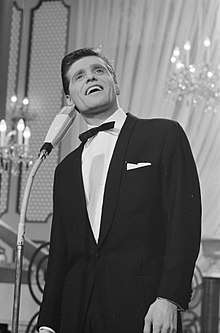 Ronnie Carroll in Luxembourg (1962)
Ronnie Carroll in Luxembourg (1962)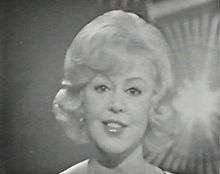 Kathy Kirby in Naples (1965)
Kathy Kirby in Naples (1965)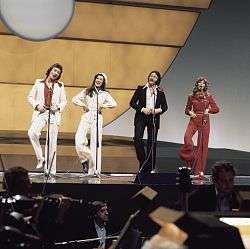 Brotherhood of Man in The Hague (1976)
Brotherhood of Man in The Hague (1976).jpg)
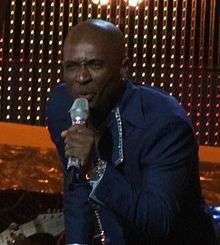 Andy Abraham in Belgrade (2008)
Andy Abraham in Belgrade (2008)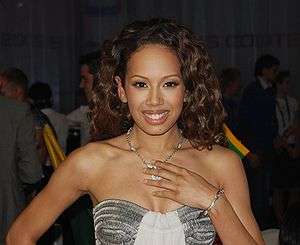
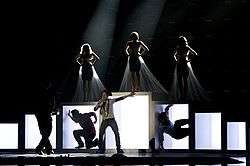 Josh Dubovie in Oslo (2010)
Josh Dubovie in Oslo (2010)
- Bonnie Tyler in Malmö (2013)
.jpg)
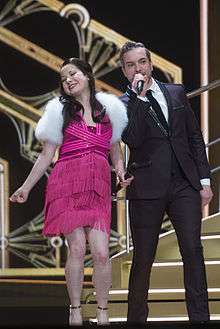 Electro Velvet in Vienna (2015)
Electro Velvet in Vienna (2015).jpg) Joe and Jake in Stockholm (2016)
Joe and Jake in Stockholm (2016) Lucie Jones in Kiev (2017)
Lucie Jones in Kiev (2017).jpg)
 Michael Rice in Tel Aviv (2019)
Michael Rice in Tel Aviv (2019)
See also
- UK national selection for the Eurovision Song Contest
- United Kingdom in the Junior Eurovision Song Contest – Junior version of the Eurovision Song Contest.
- United Kingdom in the Eurovision Dance Contest – Dance version of the Eurovision Song Contest.
- United Kingdom in the Eurovision Young Dancers – A competition organised by the EBU for younger dancers aged between 16 and 21.
- United Kingdom in the Eurovision Young Musicians – A competition organised by the EBU for musicians aged 18 years and younger.
- Scotland in the Eurovision Song Contest
- Wales in the Eurovision Song Contest
- Gibraltar in the Eurovision Song Contest
Notes and references
Notes
- In the 1969 contest, four countries drew for first place. In later contests, tiebreak rules would have resolved this and the entries ordered according to these official rules, but in 1969 no provision was in place. Therefore, all four countries were declared as joint winners. The UK was one of these countries (the other joint winners were France, the Netherlands, and Spain).
- During the voting sequence of the live show, several errors were made in the announcement of the scores, which were then adjusted after the broadcast. Both Greece and France duplicated scores, awarding the same points to multiple countries. From the Greek scores, the UK, Netherlands, Austria & Finland all had 1 point deducted after the contest and from the French scores, Austria, Germany, Israel, Italy & Portugal all had 1 point deducted. None of the adjustments affected the placing of any of the songs. The result had the UK losing 1 point from their broadcast total of 122 to a corrected score of 121.
- Spain originally gave its 6 points to Poland. After the broadcast, it was announced the Spanish voting spokesperson had wrongly pronounced 'Holland' instead of 'The Netherlands', which the voting moderator had assumed was 'Poland'. The mistake was corrected and the Dutch score was increased by 6 points, moving the nation above the UK into 7th place and demoting the UK to 8th.
- Spain originally gave its 12 points to Israel and 10 to Norway. After the broadcast it was announced that Spanish broadcaster wrongly tallied the votes and Germany should have got the top mark - 12 points - instead of being snubbed, as it happened. The mistake was corrected and so Germany was placed 7th over Norway. Israel and Norway both received 2 points less than originally and Croatia, Malta, Portugal, United Kingdom, Netherlands, Belgium, Estonia and Turkey all received one point less than indicated during the broadcast.
- The 2020 contest was cancelled due to the COVID-19 pandemic.
- It has to be assumed that Terry Wogan's commentary was taken by BFBS in 1975 since Terry says in his BBC Radio 2 commentary "Richard Astbury sends his apologies to BFBS listeners - technical difficulties".
References
- Jordan, Paul (11 January 2017). "Shining a light on the United Kingdom: 60 Years at Eurovision". eurovision.tv. European Broadcasting Union. Retrieved 13 January 2017.
Contrary to popular fan myths, the UK did not intend to enter in 1956 as the BBC had previously created their own separate contest, the Festival Of British Popular Songs
- "Shining a light on the United Kingdom: 60 Years at Eurovision". European Broadcasting Union. Retrieved 12 January 2017.
- Lawson, Mark (27 May 2012). "A belligerent Eurovision night fit for a broken Europe". (The Guardian). Retrieved 9 June 2012.
- "Bonnie Tyler". Eurovision Song Contest. Retrieved 15 May 2014.
- "2013 results". Eurovision.tv. Retrieved 15 May 2014.
- Mourinho, Daniel (1 July 2013). "Bonnie Tyler receives ESC Radio Award trophies". Eurovision Song Contest Radio. Retrieved 4 January 2013.
- "Molly Smitten-Downes to represent the UK". Eurovision.tv. Retrieved 4 May 2014.
- Freeman, Guy (6 October 2014). "Looking forward to 2015". British Broadcasting Company. Retrieved 7 October 2014.
- "BBC launches open selection for 2015 British entry". Eurovision.tv. Retrieved 7 October 2014.
- "Electro Velvet to represent the UK at Eurovision". BBC News. Retrieved 7 March 2015.
- "Public to help choose UK Eurovision entry - BBC News". BBC News Online. 30 September 2015. Retrieved 30 September 2015.
- Escudero, Victor M.; Roxburgh, Gordon (26 February 2016). "Joe & Jake to represent the United Kingdom in Stockholm". eurovision.tv. European Broadcasting Union. Retrieved 26 February 2016.
- "Eurovision Song Contest: Ukraine's Jamala wins competition - BBC News".
- "Eurovision – UK 2017 song entry now open!". BBC Media Centre. 6 October 2016. Retrieved 6 October 2016.
- "Eurovision: X Factor singer Lucie Jones to represent UK". BBC News. 28 January 2017. Retrieved 28 January 2017.
- Roxburgh, Gordon (27 January 2017). "Lucie Jones becomes the 60th entry for the United Kingdom". eurovision.tv. European Broadcasting Union. Retrieved 27 January 2017.
- "Eurovision 2017: Portugal's ballad wins contest". BBC News. 13 May 2017. Retrieved 13 May 2017.
- "BBC - BBC entertains the nation in time of need - Media Centre". www.bbc.co.uk. Retrieved 25 March 2020.
- O'Connor, John Kennedy (2005). The Eurovision Song Contest 50 Years The Official History. London: Carlton Books Limited. ISBN 978-1-84442-586-0.
- Bakker, Sietse (2010-12-31). "43 nations on 2011 participants list". Eurovision.tv. Retrieved 31 December 2010.
- Murray, Gavin (28 May 2008). "Big 4: May lose automatic place in Eurovision final". ESCToday. Retrieved 28 May 2008.
- Viniker, Barry (2008-09-14). "Eurovision 'Big Four' final spots confirmed". ESCToday. Retrieved 2008-09-14.
- Kilkelly, Daniel (2008-05-26). "BBC defends Eurovision funding". Digital Spy. Retrieved 2008-05-26.
- "BBC drops Eurovision selection public vote". 16 September 2019 – via www.bbc.co.uk.
- "United Kingdom in the Eurovision Song Contest". eurovision.tv. Retrieved 19 February 2019.
- Roxburgh, Gordon (3 February 2015). "Official: London to host Eurovision's 60th anniversary event". eurovision.tv. European Broadcasting Union. Retrieved 3 February 2015.
- Granger, Anthony (2 December 2018). "United Kingdom: Andrew Cartmell Revealed as Head of Delegation". eurovoix.com. Retrieved 5 December 2019.
- Weaver, Jessica (13 January 2018). "United Kingdom: Head of Delegation Guy Freeman to leave BBC next month". esctoday.com. Retrieved 7 December 2019.
- Farren, Neil (24 October 2018). "United Kingdom: Helen Riddell Steps Down as Head of Delegation". eurovoix.com. Retrieved 5 December 2019.
- Jiandani, Sanjay (30 July 2013). "UK: Interview with Gina G [part 1]". ESCToday. Retrieved 3 July 2020.
- "Jade delighted at top five finish". Daily Express. 16 May 2009. Retrieved 3 July 2020.
- Trivia Archived May 9, 2008, at the Wayback Machine
- Fletcher, Alex (2008-08-12). "Terry Wogan quits Eurovision role". Digital Spy. Retrieved 2008-08-12.
- "BBC Four takes over Eurovision coverage". a516digital.com. 17 January 2016. Retrieved 25 February 2016.
- "The Eurovision Song Contest 2009 – coverage". BBC. 1 May 2009. Retrieved 23 February 2020.
- Royston, Benny (30 January 2011). "Blue to sing 'I can' at Eurovision". ESCToday. Retrieved 26 February 2020.
- "Eurovision Song Contest 2010 – coverage". BBC. 11 May 2010. Retrieved 23 February 2020.
- Granger, Anthony (25 May 2012). "United Kingdom: Scott Mills To Announce UK Vote". Eurovoix. Retrieved 23 February 2020.
- "Sara Cox and Scott Mills front Eurovision semi-finals exclusively on BBC Three". BBC. 21 April 2011. Retrieved 23 February 2020.
- "Eurovision Song Contest, 2012, Semi-Final One". BBC. Retrieved 23 February 2020.
- "Eurovision Song Contest, 2012, Semi-Final Two". BBC. Retrieved 23 February 2020.
- "Eurovision Song Contest, 2012, Grand Final". BBC. Retrieved 23 February 2020.
- Granger, Anthony (7 March 2013). "United Kingdom: Ana Matronic Will Replace Sara Cox". Eurovoix. Retrieved 23 February 2020.
- Granger, Anthony (2 May 2013). "United Kingdom: Scott Mills To Announce The Voting". Eurovoix. Retrieved 23 February 2020.
- Granger, Anthony (10 April 2014). "United Kingdom: Laura Whitmore to accompany Scott". Eurovoix. Retrieved 23 February 2020.
- Granger, Anthony (8 May 2014). "United Kingdom: Scott Mills Will Announce The UK's Vote". Eurovoix. Retrieved 23 February 2020.
- Granger, Anthony (27 April 2015). "United Kingdom: Mel Giedroyc Joins Scott Mills". Eurovoix. Retrieved 23 February 2020.
- "BBC Radio 2 Eurovision Returns!". BBC. Retrieved 24 February 2020.
- Granger, Anthony (11 May 2016). "United Kingdom: Richard Osman Announced As Spokesperson". Eurovoix. Retrieved 23 February 2020.
- "X-Factor style hunt for next year's UK Eurovision entry". ITV. 30 September 2015. Retrieved 28 September 2016.
- Granger, Anthony (8 May 2017). "United Kingdom: Katrina Leskanich To Announce The Jury Points". Eurovoix. Retrieved 23 February 2020.
- Granger, Anthony (30 March 2018). "United Kingdom: BBC Reveals Eurovision Commentary Team For Lisbon". Eurovoix. Retrieved 23 February 2020.
- Herbert, Emily (5 April 2019). "United Kingdom: BBC Reveals Commentary Team for Tel Aviv". Eurovoix. Retrieved 23 February 2020.
- "Eurovision Song Contest 2019". BBC. Retrieved 23 February 2020.
- Herbert, Emily (24 April 2019). "United Kingdom: Rylan Revealed as Eurovision 2019 Spokesperson". Eurovoix. Retrieved 23 February 2020.
- Darby, Harry (2009-05-01). "United Kingdom: BBC interactive coverage plans". ESC Today. Retrieved 2009-10-05.
- "BBC starts new weekly podcast 'Eurovision Calling'". eurovision.tv. 12 February 2019. Retrieved 19 February 2019.
- "BBC Sounds - Eurovision Calling". BBC. Retrieved 19 February 2019.
- "Scotland heading for 2009 bid?". eurovision.tv. Retrieved 2008-02-12.
- Kuipers, Michael (28 May 2008). "United Kingdom will not withdraw". esctoday.com. ESCToday. Retrieved 26 May 2008.
- "Scotland given the go-ahead to enter Eurovision!". oikotimes.com. Archived from the original on 2009-02-07. Retrieved 2008-02-11.
- "Scotland may submit its own Eurovision entry". TheHerald.co.uk. Archived from the original on 2009-02-06. Retrieved 2008-02-11.
- "Scotland Given Go-Ahead To Launch Own Eurovision Entry". DailyRecord.co.uk. Archived from the original on 2008-02-14. Retrieved 2008-02-11.
- Davies, Russell (11 February 2008). "Scotland: first Eurovision Song Contest entry?". esctoday.com. ESCToday. Retrieved 11 February 2008.
- "Cân i Gymru". S4C.co.uk.
- Lewis, Cole (17 July 2008). "JESC: UK Less Likely To Participate". esctoday.com. ESCToday. Retrieved 26 May 2008.
- "Northernirelandeurovision.com". northernirelandeurovision.com. Retrieved 19 February 2019.
- "Scotland's Referendum 2014: What will happen to the BBC following independence?". Scottish Government. Retrieved 29 November 2013.
- "Scotland's Referendum 2014: Would the Scottish Broadcasting Service (SBS) join the European Broadcasting Union (EBU)?". Scottish Government. Retrieved 29 November 2013.
- Holehouse, Matthew (19 September 2014). "Scottish independence referendum results as it happened". The Daily Telegraph. Retrieved 26 June 2016.
- Granger, Anthony (25 March 2015). "Gibraltar: No Plans To Broadcast Eurovision". eurovoix.com. Eurovoix. Retrieved 12 September 2016.